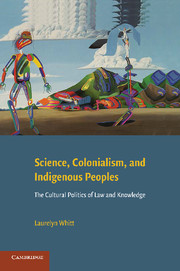Book contents
PART III - LEGITIMATION: THE RULE AND ROLE OF LAW
Published online by Cambridge University Press: 04 August 2010
Summary
The value-neutral/value-bifurcated ideology of the new imperial science is part of the rhetorical tool kit which masks the moral and political character of biocolonialism, deflecting indigenist critiques. There is a larger story to be told about power here, however, for biocolonialism is the product of an alliance forged by the biotechnology industry with the dominant legal system. In the remainder of this book, key aspects of this story, and their implications for indigenous peoples, are considered. The commodification of knowledge and the collusion of intellectual property law are central to my discussion.
Indigenous resistance to biocolonialism, and notably the strong critiques that have been made of the Diversity Project, derive in part from a refusal to construe certain types of knowledge as a commodity. For many indigenous peoples, knowledge of the natural world (especially medicinal and agricultural knowledge) is only properly construed as a gift. Chapter 6 contrasts gift and commodity conceptions of knowledge, and links that contrast to biocolonialism. It concludes by examining the role of economic and political entrepreneurship in contemporary biotechnoscience.
Whether knowledge is regarded as a commercial exchange in the marketplace or as the reciprocal exchange of gifts, an understanding of power relations is integral to an understanding of knowledge systems. As we have seen in Chapter 3, several recent science theorists have argued that questions of knowledge cannot be divorced from those of power.
- Type
- Chapter
- Information
- Science, Colonialism, and Indigenous PeoplesThe Cultural Politics of Law and Knowledge, pp. 133 - 135Publisher: Cambridge University PressPrint publication year: 2009



